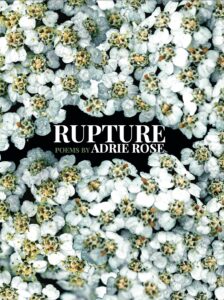 Review by Mindy Kronenberg
Review by Mindy Kronenberg
Adrie Rose’s Rupture arrives at a time of profound concern for women’s health issues, and her journey of dealing with an ectopic pregnancy brings a poignant and painful lens to the intricate and intimate details of a life set off-course by a series of startling personal events. With bravery and eloquence, the poet revisits exasperating moments and memories, where the body and desire are betrayed unexpectedly, and the self forges a quiet but determined path forward.
The title itself implies a bursting or breach, whether in the body or of our certainty of being loved. There’s the bloodless accounting of medical care, a debt incurred for one’s fragile mortality (from “Rupture,” 1) :
1.
Later there will be a bill
in dollars
and cents,
but here
in the operating room
we barter—
I give them
a pint
of blood,
flesh that might
have been a baby,
one fallopian tube
and they give me
three scars and
my life.
In this modest book of fifteen powerful poems we can feel the turbulence of both physical discomfort and internal tumult, expressed in evocative, sensory language that captures the echoes of grief. In “The Cello” (6) the poet is awakened to an unfamiliar intensity, as if she “…had only heard music from a fuzzy radio” to being transported to the middle of the symphonic swells of an orchestra, “…the timpani vibrating up through my feet… .” The disturbance is tangible as it is startling, and she states
…I knew how the unbroken pond feels when the stone
enters, the undulation of each ripple towards shore. For days,
when I thought of you, my hand went to my throat,
my body vibrating, like the cello when the soloist
has set down her bow–…
Within the emptiness of a failed pregnancy and abandonment by her partner, life and its rituals persist. Memory tangles with regret, synthesizes into anger. Each season harbors its own anticipations, carries a wistful tale. In the spring, the harbinger of rebirth, despair penetrates day-to-day existence, intensifies feelings of loss, as evidenced in “Spring–& Everyone Seems So Fucking Happy” (p.10):
No seeds to sow.
The taste
of silt. Scorched grass.
My rage?
There is no time,
no cradle for it.
This morning, shaky again,
I drop the spoon, flip
over the bowl of oatmeal
as I try to stir it cool.
In “In July, Weeds Take Over the Garden” (p. 17), there’s a lingering question of what becomes overrun in the face of absence. It’s part of a cycle in how nature taunts us, how pain can remerge long after the damage:
Who chooses
what survives, and why?
July brings back roses
everywhere as if we were celebrating.
The baby would be born now.
In “Near Solstice” (p. 22) there’s a will to “seal and bind the past/ so it stays past,” retrace moments of dashed hope to release their hold, resist the formidable presence of the cold, and prove endurance while she falls in and out of sleep, waking “…in the night to load the stove/ so the pipes don’t freeze.//Listen to the house crack and shriek/ as the cold wrenches wood from nails.” And yet, she also states “If spring comes, I will plant/peach trees.// Will spread wood ash/ to sweeten the soil.”
The poems throughout Rupture are often visceral and disquieting, but eloquently and delicately determined, a contemporary woman’s journey of physical and emotional trauma and transformation, revealing how we can be undone and still move forward to being whole again.
Rupture By Adrie Rose
Gold Line Press, 2024
Mindy Kronenberg is an award-winning poet and writer with numerous publication credits world-wide. She teaches writing, literature, and arts subjects at SUNY Empire State University, is the editor of Oberon poetry magazine, and the author of Dismantling the Playground (Birnham Wood), Images of America: Miller Place (Arcadia), and OPEN, an illustrated poetry book (Clare Songbirds Publishers).
